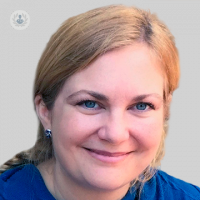All about breast reduction and uplift procedures
Written by:Of all reasons to have breast surgery, the media arguably most commonly associates it with the desire to increase breast size. However, breast reductions and uplifts are also common procedures and provide natural and desired results to many women around the country. The two procedures do share similarities, but also have their differences. Miss Judith Hunter explains all about how they are performed, post-operative care, scarring and when your level of activity can return to normal.

What is the aim of breast surgery
Breast reductions and breast uplifts (also known as a mastopexy) are different types of the same procedure. The aim of both is to transform a patient’s droopy breast with a low nipple into an uplifted and perkier breast with a higher nipple.
How is a breast reduction performed?
A breast reduction involves lifting the nipple. The nipple is kept alive by leaving it attached to a column of tissue inside the breast and then wedges of breast skin and tissue are taken out to reduce the volume and reshape the breast.
How is a breast uplift (mastopexy) performed?
A breast uplift (mastopexy) involves lifting the nipple in a similar way but it may only involve reshaping the breast and tightening the skin without reducing volume. It can also be combined with an implant to enlarge and reshape the breast, this is called an augment mastopexy.
Will there be scarring?
All these procedures involve a scar around the nipple. Other scars that go vertically from the nipple downwards and horizontally in the breast fold can occur. These depend on:
- The shape and size of the breasts to start with
- What the patient hopes to achieve
These often result in an ‘anchor’ or ‘inverted T’ shaped scar.
How long do these procedures take?
Both breast reductions and breast uplifts take around two to three hours and are performed under general anaesthetic (which means that the patient is fully asleep).
How do I prepare for a breast reduction?
A patient must not eat or drink anything other than water in the six to four hours prior to the procedure. Two hours before the procedure, they must also stop consuming water. A pre-operative assessment will be conducted and occasionally blood tests are taken.
What's the post-operative care?
A breast uplift may be performed as a day case whereas usually, a breast reduction requires an overnight stay. After these procedures, liquid can build up during the healing process. Drains may be left in place to ease the discomfort from this build-up and to aid healing. Usually, they are kept in overnight.
These drains are often removed the following morning and the patient can then leave the hospital and return home. They're provided with a supportive bra that is fitted at the end of the operation. It is then necessary to continue wearing the support bra all day and night for six weeks.
How long until my activity can return to normal?
After both procedures, the ability to walk is not affected and the patient can walk as normal. Despite this, they are expected to take one to two weeks off work due to the upper body needing time to recover. Furthermore, it’s necessary to avoid heavy lifting or upper bodywork at the gym for a month. It’s also important to not drive during this month either.
Should you choose to visit Miss Hunter’s practice for a breast reduction or an uplift, you will be seen by Miss Hunter one to two weeks after your surgery. At this appointment, the wounds will be checked to ensure that they are healing as well as they should be. Miss Hunter will then see you around six weeks after the surgery.
Miss Hunter, a consultant plastic, reconstructive, and aesthetic surgeon, has trained for over 10 years in plastic and reconstructive surgery and has vast experience in performing breast reductions and breast uplifts. If you are looking to alter your breasts, don’t hesitate to book a consultation via her profile to hear about how she can help you.


